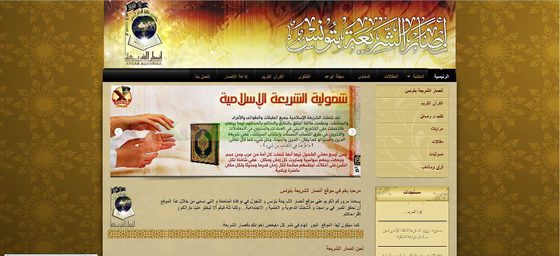Ansar al Sharia Tunisia, the al Qaeda-linked extremist group responsible for the Sept. 14, 2012 assault on the US Embassy in Tunis, has launched a new website. The group advertised the impending launch of the site on various Facebook pages and other extremist sites for weeks. A screen shot of the new site can be seen at the top of this article.
Some of the content on the site is not yet filled in, but the web page includes sections for articles, a chat forum, fatwas, and videos, among other topic areas.
One section appears to be set aside for an online library that will house the works of various extremists, including al Qaeda cleric Abu Qatada. Seifullah ben Hassine (a.k.a. Abu Iyad al Tunisi), the founder of Ansar al Sharia Tunisia, reportedly studied under Qatada. Few, if any, of Qatada’s or the other extremists’ writings had been uploaded to the online library by the time The Long War Journal last viewed the page.
The new site is part of Ansar al Sharia Tunisia’s revamped online media campaign. For weeks, the group’s Facebook pages have been routinely taken down. It is not clear who is responsible for the website interruptions, but Ansar al Sharia has regularly complained about the deletion of its Facebook pages. One entry on the group’s new chat forum, for instance, solicits advice concerning the deletions.
Other entries on the forum deal with Mali and Syria, including statements issued by the Al Nusrah Front, al Qaeda’s Syrian affiliate. One post highlights the “martyrdom” of a Tunisian who died fighting in Syria.
In January, Ansar al Sharia Tunisia rebranded its official Facebook page to honor al Qaeda’s “martyrs,” including the deputy leader of al Qaeda in the Arabian Peninsula (AQAP), Said al Shihri. [See LWJ report, Ansar al Sharia honors senior al Qaeda ‘martyrs’.]
Since then, the group has been forced to change the url of its Facebook page on multiple occasions. (Its official Twitter feed has remained online during this time, but has not been updated in the past week.)
It appears that Ansar al Sharia Tunisia has also now launched a number of new Facebook pages, many of which are dedicated to the group’s franchises in various Tunisian cities. The proliferation of pages may be part of a new strategy by the organization to avoid losing its social media presence when a single site is lost.
The posts on these various Facebook pages range in content, from those dealing with the organization’s dawa, or proselytizing, to entries praising global jihadists such as deceased al Qaeda master Osama bin Laden.
Ansar al Sharia Tunisia
Ansar al Sharia Tunisia is headed by Seifullah ben Hassine (a.k.a. Abu Iyad al Tunisi), who has longstanding ties to al Qaeda. In 2000, Hassine co-founded the Tunisian Combatant Group (TCG), an al Qaeda-affiliated group that participated in the Sept. 9, 2001 assassination of Northern Alliance leader Ahmed Shah Massoud in Afghanistan.
Hassine was arrested in Turkey in 2003 and deported to Tunisia, where he was sentenced to more than 40 years in prison. Hassine was released from prison in 2011, in the wake of the Tunisian revolution.
According to the Middle East Research Institute (MEMRI), Hassine eulogized Osama bin Laden after the al Qaeda master was killed in May 2011. “Let the entire world celebrate the death of one of our Ummah’s leaders,” Hassine said, “since the death and martyrdom of our leaders for the sake of this straight path … is an indication of the truthfulness of our way.”
MEMRI noted that in the eulogy, Hassine added that the death of bin Laden and other “brothers and leaders,” such as al Qaeda in Iraq leaders Abu Musab al Zarqawi and Abu Omar al Baghdadi, should compel Muslims to fight on. “This is the allegiance, and that is the promise to Allah – do not regress after the death of your sheikh [i.e., bin Laden], or the deaths of your leaders,” Hassine said. “Remain steadfast – and die for [the same cause] for which the best among you died.”
Two other Ansar al Sharia Tunisia leaders are Sami Ben Khemais Essid and Mehdi Kammoun, both of whom were convicted by Italian courts for their participation in al Qaeda’s operations in Italy. Essid was the head of al Qaeda in Italy before his arrest. According to the US State Department and other sources, Essid plotted to attack the US Embassy in Rome in early 2001. Both Essid and Kammoun were convicted in Italy of terrorism charges, deported to Tunisia for further imprisonment, but released in 2011 after the Tunisian revolution.
After the Sept. 14, 2012 assault on the US Embassy in Tunis, the Tunisian government imprisoned numerous Ansar al Sharia members. One of them is Bilel Chaouachi, a young imam who has openly praised Osama bin Laden and Ayman al Zawahiri.
On Dec. 21, 2012, the Tunisian government announced that it had arrested members of an al Qaeda terrorist cell who had been trained by al Qaeda in the Islamic Maghreb (AQIM) and “were active within” Ansar al Sharia Tunisia.
In December 2012 and January 2013, Ansar al Sharia posted at least three entries on social media related to the Sept. 11, 2012 terrorist attack in Benghazi, Libya. In December, the group posted pictures of three FBI agents who were sent to Tunisia to interview Ali Ani al Harzi, an important suspect in the Benghazi assault. It also posted a video to its You Tube page of a lawyer discussing the FBI’s presence in Tunis to interview Harzi. In January 2013, the group posted a video of Harzi being released from a Tunisian prison.
Also in January 2013, Ansar al Sharia Tunisia rebranded its official Facebook page to honor Said al Shihri, the deceased deputy leader of al Qaeda in the Arabian Peninsula.








